To bring order to the growing presence of dispensing boxes across the city, the Prague City Council has approved a new framework outlining how and where these boxes can be installed on public land.
The initiative reflects a growing need to balance the convenience of self-service parcel pickup with the preservation of Prague’s public spaces. The regulations aim to eliminate clutter and prevent interference with pedestrian movement, traffic, and the city’s architectural landscape.
“Dispensing boxes are a useful service for residents and reduce traffic congestion, but their placement must be respectful of public space,” said Petr Hlaváček, Deputy Mayor for Spatial Development. “I see this agreement with operators as a meaningful step forward.”
The new framework prioritizes integration of parcel boxes into building façades, supermarket entrances, or transportation hubs. These locations are seen as the least intrusive and most accessible.
If those options are unavailable, alternative placements will be considered—but only if they don’t block pedestrian access, obstruct architectural features, or contribute to visual pollution.
“Without rules, parcel boxes can cause damage, create noise, and harm the city’s visual character,” said Zdeněk Hřib, Deputy Minister for Transport. “The new standards protect both utility and the urban environment.”
Currently, most dispensing boxes are placed outside city-owned land, giving local authorities limited control over their appearance and impact. With the new policy, that’s set to change.
“We don’t oppose the boxes on city property,” said Adam Zábranský, Councilor for Property. “But we want it done properly. That’s why I’m glad we’ve approved these rules.”
In the future, the city plans to sign a memorandum of understanding with major box operators to expand these standards even to non-city plots. The idea is to encourage companies to voluntarily comply with the guidelines, even where the city has no direct authority.
“We view these boxes as part of the city’s infrastructure,” said Ondřej Boháč, Director of IPR Prague. “They’re helpful, but only if designed and placed with care. The new rules set clear boundaries for where they belong—and where they don’t.”
Under the agreement, the city would offer suitable land for installations, while operators would commit to adapting their designs and technology to match the character of each location.
Would you like us to write about your business? Find out more
Thousands of professionals will swap office desks for running shoes this week as the UniCredit Prague Relay returns to Stromovka Park.
Held over two days—Tuesday, June 24 and Wednesday, June 25—the event features 8,000 registered runners from across the banking, diplomatic, medical, aviation, and automotive sectors.
Organized by RunCzech, the relay aims to bring corporate teams together in a more active setting. “We’re getting managers moving again, racing against others from their industries,” said RunCzech chairman Carlo Capalbo.
Each team member runs a 5 km loop through Stromovka, passing landmarks like the Governor’s Summer Palace and the Prague Planetarium.
The route stays entirely within the park, so public transport and city traffic remain unaffected. With warm weather expected, organizers are adding misting zones and refreshment stations along the course.
Tuesday’s relays include a Diplomatic Cup and Bank Cup, with teams from embassies, ministries, and Czech banks. On Wednesday, professionals in medicine, aviation, commerce, and the automotive industry will take their turn at the starting line.
Runners can unwind after the race with picnic boxes and DJ sets, with team tents available along the track for post-race hangouts. “It’s a way to get people moving before summer—and make some memories along the way,” Capalbo added.
The UniCredit Relay follows Stromovka’s earlier role in hosting the Junior Marathon and the dm bambini run during May’s ORLEN Prague Marathon.
Would you like us to write about your business? Find out more
Dave Chappelle, a comedian known for his uncompromising humor and original view of society, will perform for the first time at Prague’s Hybernia Theater on July 20.
Chappelle is recognized as one of the greatest comedians of all time. He is the 2019 recipient of the Kennedy Center’s Mark Twain Prize for American Humor and the 2025 NAACP President’s Award.
Chappelle’s work in television and film includes his groundbreaking sketch comedy series “Chappelle’s Show,” which became the best-selling TV show in DVD history, multiple Netflix comedy specials, and memorable guest appearances on “Saturday Night Live.”
He has earned five Emmy Awards, including three for his Netflix specials and two for hosting “Saturday Night Live” (2017, 2021), where his most recent 17-minute monologue stands as the longest in the show’s 50-year history.
Chappelle has won six Grammy Awards for Best Comedy Album, including his most recent for “The Dreamer” (2025).
Important info:
Please print your tickets, which must be presented in paper form for inspection upon entering the Hybernia Theater and your seating sections. To purchase refreshments at the theater, please use a physical payment card or cash.
This performance is PHONE-FREE. No devices for recording photos, videos, or audio are permitted. Upon arrival at the Hybernia Theater, phones and other devices for capturing photos, videos, or audio will be stored in Yondr cases.
During the performance, you will keep your phone/device secured in the pouch with you, and if necessary, you can have the pouch with your phone unlocked at any time in the designated phone use area at the marked locations.
In the event of a violation of these conditions at this performance, the visitor will be immediately escorted from the building without the possibility of a refund.
Tickets:
Ticket prices from CZK 1,190. On sale at Ticketmaster from 26 June at 10:00.
Would you like us to write about your business? Find out more
The announcement of hefty infrastructure investment is a timely one, just months away from crucial parliamentary elections.
The Czech government has approved a 65 billion CZK (€2.6 billion) loan from the European Investment Bank (EIB) to support the country’s transport infrastructure, with the bulk of the funds allocated to railway development.
Transport Minister Martin Kupka (ODS) announced the decision following a cabinet meeting, calling the loan a cost-effective way to meet urgent investment needs.
According to Kupka, 55 billion crowns will be used for railway projects across the country, while 10 billion will go toward the construction of a key section of the Prague Ring Road, known as segment 511.
This section will link the D1 and D11 motorways and is currently under construction, with completion expected in 2027.
“The Czech Republic needs the money to repay its infrastructure debt as quickly as possible,” Kupka said, adding that the EIB loan terms are favorable compared to other financing options.
“For each tranche, the Ministry of Finance decides whether it can obtain cheaper financing or whether to opt for an EIB loan. Today, the government has assessed that this loan is currently the best choice.”
While specific railway projects funded by the loan were not named, Kupka highlighted the need to modernize and expand the country’s rail network.
The EIB, whose shareholders are the EU member states, provides long-term loans to support strategic projects that align with EU policy objectives.
Would you like us to write about your business? Find out more
The Prague City Council has voted against a proposal to ban shared electric scooters from parts of the capital, despite ongoing complaints over traffic safety, cluttered sidewalks, and poor regulation.
The motion, introduced by Deputy Mayor Zdeněk Hřib (Pirates), aimed to limit the use of shared e-scooters by enforcing stricter placement rules.
According to the proposal, only scooters stored in designated public zones would be allowed, and any devices found outside these areas would be removed by the city’s Technical Road Administration (TSK).
However, only Pirate Party councilors backed the plan during Monday’s vote, leading to its rejection.
The proposed system was designed to bring e-scooters and shared bicycles under the same regulatory umbrella. Operators would have been required to pay a monthly parking fee of CZK 25 per vehicle and ensure devices were parked only in marked spaces.
If not, TSK would have been authorized to impose fines starting at CZK 100, rising to CZK 1,000 if issues weren’t resolved promptly. Scooters could then be confiscated and released only after payment. Reserved spots would have also been accessible to private bicycle users.
The rejected policy outlined a number of public safety and order concerns linked to e-scooter use in Prague, including a high number of accidents, frequent violations of traffic laws, and misuse in pedestrian areas like parks and sidewalks.
Officials emphasized that while the city supports shared mobility in general, electric scooters are often used more for recreation than transport, particularly in places not suited for vehicle traffic.
In central districts such as Prague 1, frustration with e-scooters has grown. Local leaders have long pushed for a citywide ban, insisting on a clear legal framework established through municipal ordinances.
However, city officials argue that the proposed system was already aligned with guidance from national ministries—namely Transport, Interior, and Industry and Trade—which recommend regulating micromobility through contracts rather than full bans.
Globally, cities like Paris, Madrid, and Melbourne have already banned or heavily restricted shared electric scooters due to similar issues with safety, accessibility, and enforcement.
Would you like us to write about your business? Find out more
Czechia has submitted a bid to host one of Europe’s first AI Gigafactories—a massive data center dedicated to the development of artificial intelligence—on the outskirts of Prague.
The facility, with an estimated cost of 90 billion CZK (approximately €3.5 billion), would be built in the municipality of Jíloviště, just beyond Prague’s southern border.
The application, submitted by the Ministry of Industry and Trade to the European Commission on Friday, June 20th, is part of a larger EU initiative to build five AI-focused gigafactories across Europe.
The EU has earmarked nearly €20 billion (close to 500 billion CZK) for the initiative under its strategic investment program for digital infrastructure.
The Czech bid proposes using land owned by České Radiokomunikace (CRA), a major telecom and infrastructure provider, which had previously planned to build a smaller data center on the same site. CRA will now serve as a co-investor in the project and is expected to take over operation of the future facility if the plan is approved.
“We’ve already prepared a project called Prague Gateway DC, one of the most modern and largest data centers in the region,” said Anna Tůmová, CRA spokesperson. “That’s why CRA is logically involved in this AI gigafactory initiative.”
Powerful Infrastructure Ready to Scale
The Zbraslav-Jíloviště location was selected for its robust energy capacity. According to Deputy Minister Jan Kavalírek, CRA has secured an initial power input of 26 megawatts, which would be expanded to 77 megawatts in the next phase. This would enable the operation of 100,000 high-performance AI chips, he added.
Once completed, CRA would allocate computing capacity for commercial purposes, European Commission programs, and Czech scientific institutions focusing on research and development.
European Competition Is Heating Up
Czechia is not the only country vying for an AI gigafactory. Germany, Denmark, and likely Poland and Romania are also preparing bids. However, Czech officials believe they have a key advantage: project readiness.
“České Radiokomunikace already has the documentation ready and is awaiting a green light to begin construction,” Kavalírek noted.
The European Commission is expected to decide which countries will receive funding by the end of 2025. If the Czech bid is successful, construction could begin shortly after, with the facility expected to be operational by late 2028.
Would you like us to write about your business? Find out more
Summer in Prague can be tough—hot days, little breeze, and crowded streets. While the city offers plenty of outdoor swimming pools, not everyone enjoys the chlorinated water or concrete surroundings.
Many locals and visitors prefer to cool off in natural settings, away from the noise.
That’s why we’ve put together a list of the best natural beaches and swimming spots in Prague—ideal for anyone looking to escape the heat without leaving the city.
Zlute Lazne
A large beach near the city center with a lot of entertainment included. Located on the Vltava River’s right bank, it offers several restaurants, children-friendly spaces, a dance floor, and boat rental. For those who prefer active sports, tennis, ping pong, and volleyball can be found there. Parking and bathrooms are also on the spot.
- Address: Podolské nábřeží 3/1184, Praha 4-Podoli
- Working hours: daily from 09:00 till 22:00;
- Cost: 100 CZK for adults/day
- Website
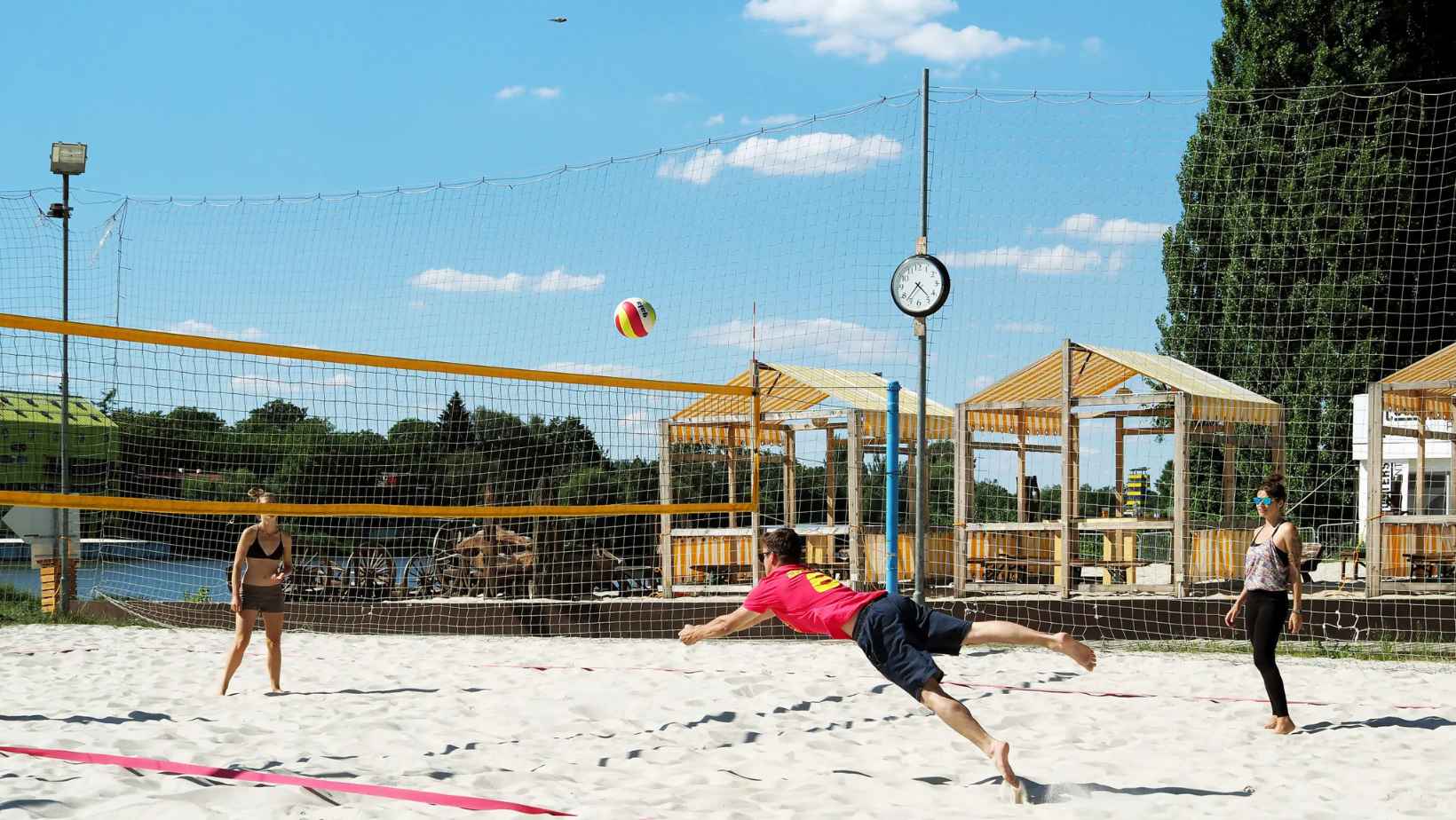
Koupaliště Lhotka
In July 2018, after seven years of being inactive, the reservoir “Lhotka” in Prague reopened. It underwent extensive reconstruction and now serves as a biotope. The water in the basin remains clean thanks to natural biological processes, without the use of chlorine and other chemicals.
The facility has been equipped with new changing rooms, a pier, benches, snack stalls, a beach volleyball court, and other sports and recreational activities. The depth of the reservoir at its lowest point is 3 meters. On its website, you can check the current visitor count via a webcam.
Working hours vary during the summer. In June, Lhotka reservoir will be open from 10:00 – 18:00 from Monday till Thursday and 9:00 – 19:00 during the weekend with Friday included. During the rest of the summer, working hours are stable: 9:00 – 20:00.
- Address: Nad Koupadly, 142 00 Praha 4
- Cost: 150 CZK for adults, with discounts after 15:00 applied.
- Website
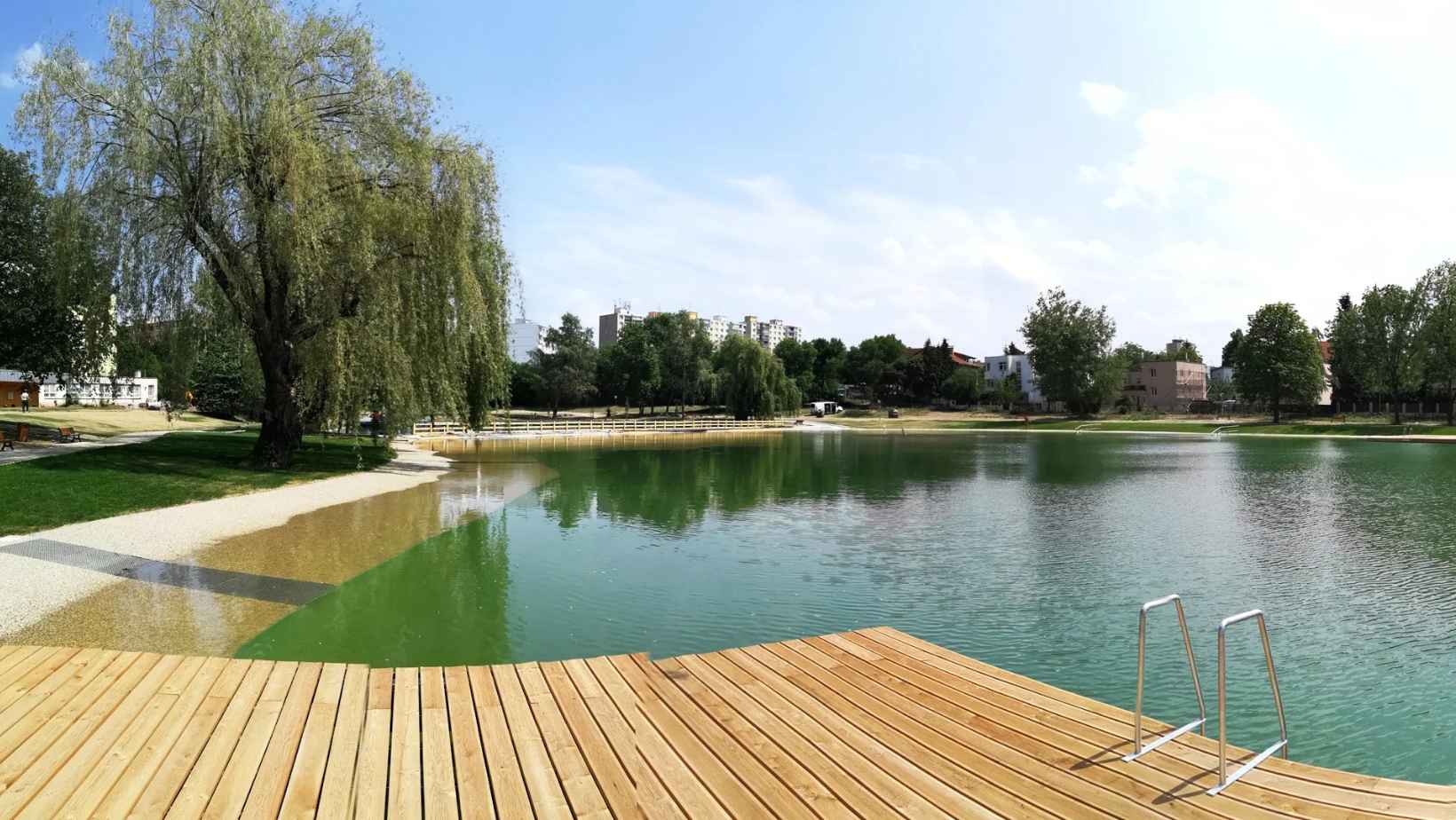
Biotop Radotín
Eight years ago, on the left bank of the Berounka River, an artificial reservoir for swimming was opened. This was the first biotope in Prague. Here, you can swim in clean natural water instead of chlorinated water, which is typical of regular pools. There is also a separate water playground for children.
Within the premises of the reservoir, there are facilities such as changing rooms, outdoor shower cabins, a sauna, an indoor pool, restroom facilities, a cafeteria, and a parking area.
- Address: K Lázním 153 00, Praha 5 — Radotín
- Working hours: daily from 09:00 till 20:00
- Cost: 200 CZK for the whole day or 60 CZK per one hour
- Website
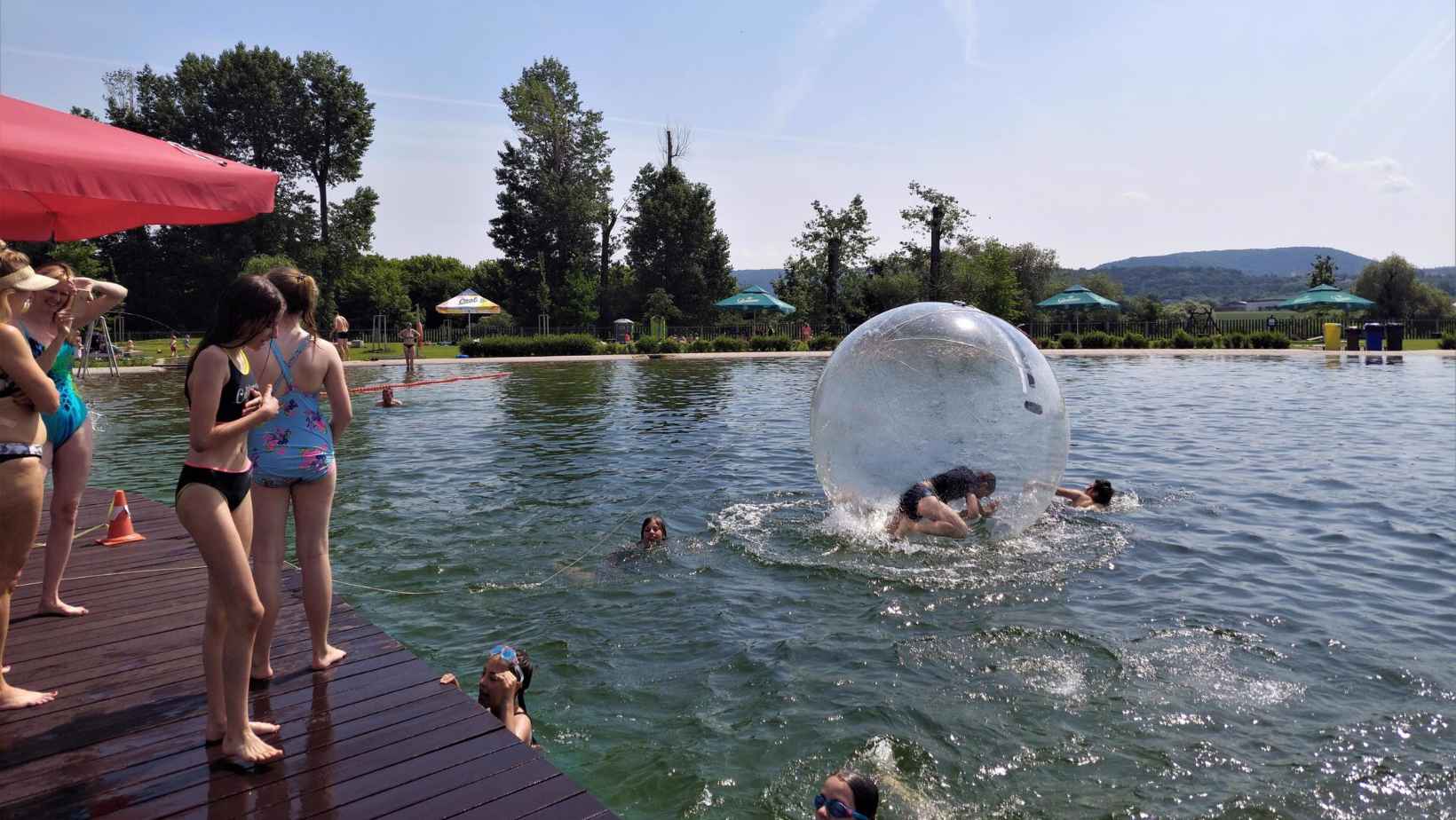
Hostivařská přehrada
Located at the border of Prague 10 and Prague 15, within a picturesque forest park, is the largest urban reservoir spanning an impressive 43.8 hectares. It boasts a delightful sandy beach, where visitors can rent sun loungers and enjoy soaking up the sun’s rays.
A wooden pier has been specifically constructed for those who prefer sunbathing by the water. On weekends, the reservoir attracts a considerable number of people. While the majority of the reservoir’s floor consists of sandy areas, occasional muddy spots can also be found.
A wide range of entertainment options is available, including a thrilling water slide, boat rentals, table tennis, Russian lapt (a traditional ball game), beach volleyball courts, football tennis (nohejbal), streetball, and a versatile tennis court.
The area is thoughtfully equipped with a children’s playground, several quick-service food stalls, a beach bar, a restaurant, restrooms, showers, changing rooms, and ample parking facilities. Additionally, a designated section of the beach caters to nudist visitors.
- Address: K Jezeru, Praha 10 – Hostivař
- Working hours: daily from 9:00 to 20:00
- Cost: 170 CZK for adults, with discounts after 15:00 applied.
- Website
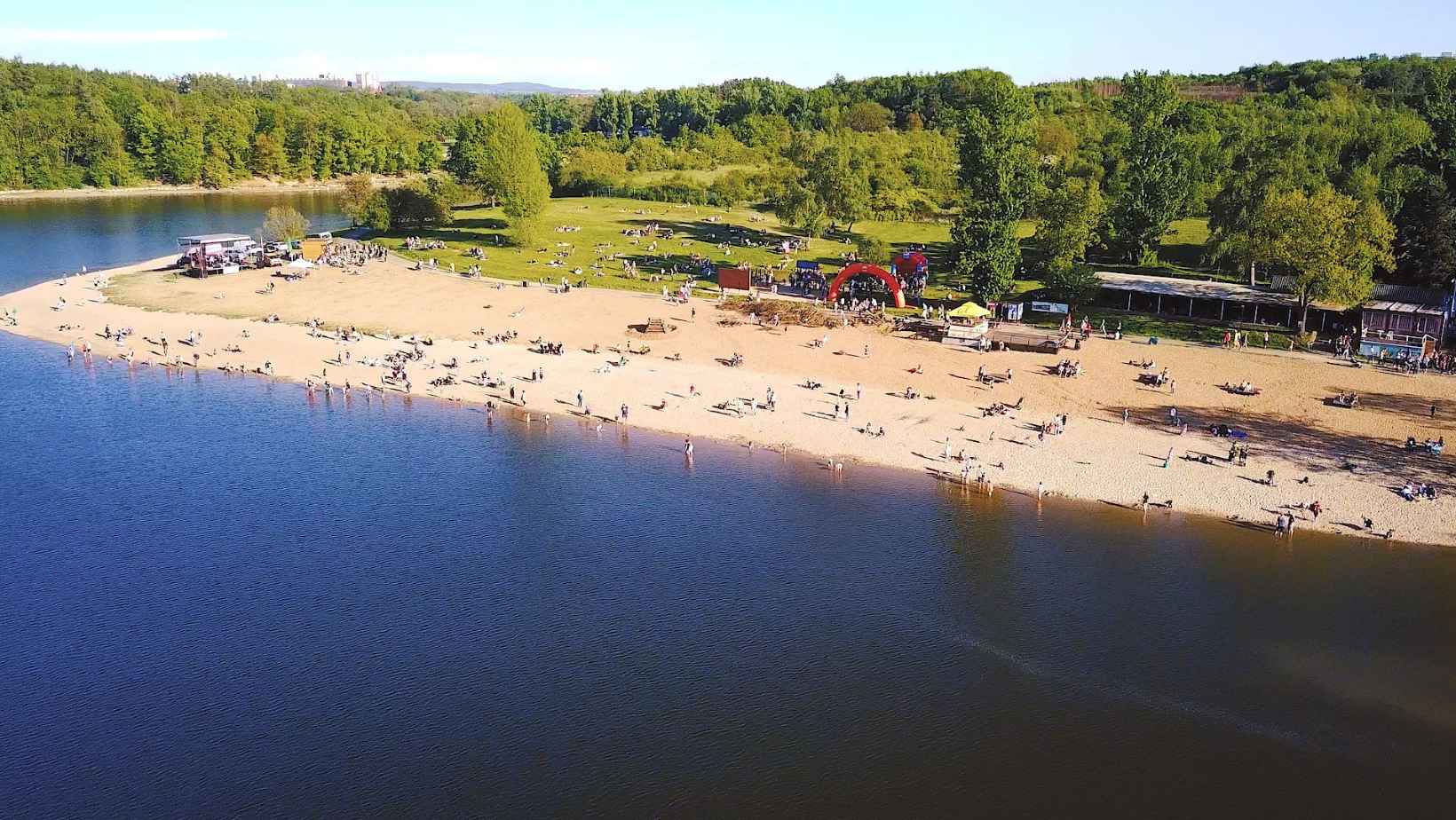
Koupaliště Motol
Dubbed as the “village in the heart of the city” by Prague residents, this place exudes a charming atmosphere. The reservoir is enveloped by lush trees and shrubs, creating a verdant and inviting environment. With its shallow depth of up to 3 meters and pristine sandy bottom, the water in “Motol” has earned the distinction of being the cleanest reservoir in Prague, a title it has held for several consecutive years.
The sand, meticulously chosen for its fine texture, adds to the sensory pleasure of walking barefoot along the shore. The beach itself is covered in grass and offers a gradual entry into the water.
Visitors to the area have access to various amenities, including sports equipment and sun umbrellas available for rent. Additionally, there is a designated nudist beach, a volleyball court, table tennis, private changing cabins, quick-service food stalls, and shower facilities. The presence of lifeguards ensures safety on the premises.
- Address: Zahradníčkova ulice, Praha 5
- Working hours: daily from 9:30 till 20:00
- Cost: 140 CZK for an all-day pass for adults
- Website
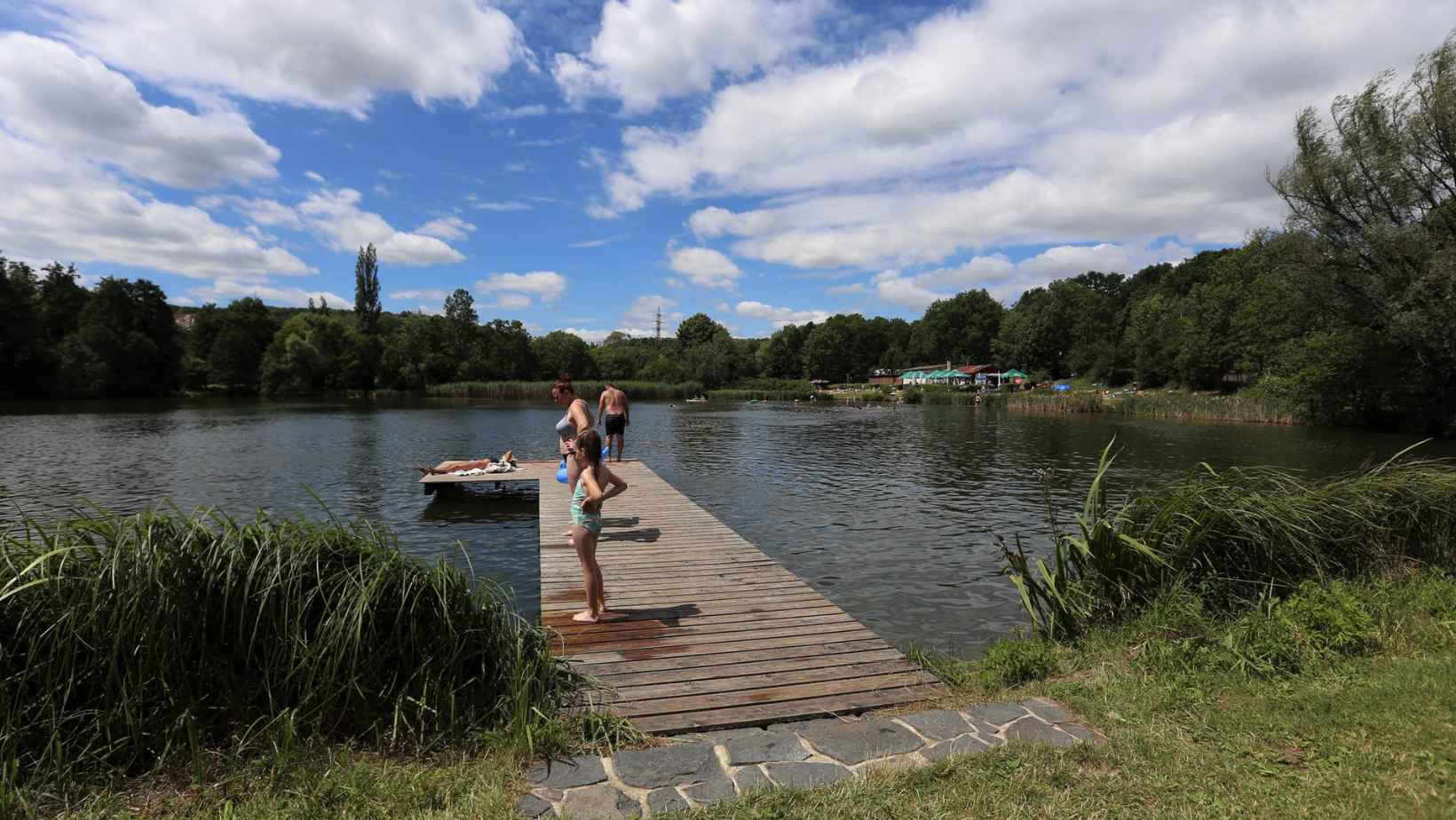
Would you like us to write about your business? Find out more
The much-anticipated arrival of Five Guys, the American fast food chain known for its made-to-order burgers and generous toppings, has been delayed yet again.
The first Czech location was originally slated to open more than a year ago inside the Máj department store on Národní třída.
Initial plans suggested a launch in summer 2023, then autumn, and later spring 2024. But the doors have remained closed. The latest estimate now points to autumn 2025, with September floated as the possible opening month.
For months, a bold red banner announcing “Five Guys Coming Soon” has hung in the department store’s window, teasing passersby on one of Prague’s busiest streets. Still, there has been no official confirmation from the chain itself.
“According to our information, Five Guys is planning to open in September,” said Jan Kotrbáček, head of the retail leasing team for Central and Eastern Europe at Cushman & Wakefield, in an interview with iDNES.cz.
But until the chain formally announces the date, the speculation continues.
In Czechia, the Five Guys franchise is operated by Monterock International, the same company behind several Five Guys branches in Vienna.
The brand’s core philosophy is simple: no frozen ingredients, no preservatives, and everything is prepared fresh in front of the customer.
What sets Five Guys apart is not just the quality of its ingredients, but also the customization it offers. Customers can choose from a wide range of free toppings—including grilled onions, jalapeños, extra bacon, and multiple sauces—giving them full control over their burger.
According to Five Guys’ pricing policy in other European markets, the price of a basic burger could be around 11 euros, or roughly 275 crowns.
Would you like us to write about your business? Find out more
The Czech Republic is heading into a week of intense summer heat with temperatures soaring well above 30°C – but the sunshine won’t last without interruptions.
Strong storms are expected to break through the heat, bringing a mix of sun, showers, and sudden weather shifts.
Stormy Start After a Sunny Monday
The week will kick off with sunshine, but the weather will shift quickly. A cold front from the west is expected to reach Czechia on Monday, bringing showers and occasional strong thunderstorms across most of the country. Temperatures will peak between 25°C and 33°C, with Moravia likely to be the hottest region.
Brief Cool-Down on Tuesday
Following Monday’s stormy front, Tuesday brings a short-lived break in the extreme heat. Expect partly cloudy skies, especially in the northeast, where intermittent showers may still occur. Temperatures will stay comfortable, ranging from 23°C to 29°C, with light breezes throughout the day.
Midweek Heat Peaks Again
Summer will regain full strength on Wednesday. The forecast shows clear to partly cloudy skies with temperatures reaching up to 32°C. Dry air and light to moderate winds will make it an ideal day for outdoor activities — whether that’s a day by the pool, a hike, or relaxing near water with a cold drink.
Thursday Brings Another Wave of Storms
Thursday morning may start out sunny in the east, but clouds and thunderstorms are expected to move in during the day, especially in Bohemia. While eastern regions could still reach 33°C, western areas will cool to around 25°C. The day will be marked by a light south to southeast wind, which may intensify with the arrival of the front and accompanying storms.
A More Stable Weekend Ahead
From Friday through Sunday, the weather should settle into a more pleasant, stable pattern. Skies will be mostly partly cloudy, with occasional isolated showers or thunderstorms in some areas. Night temperatures will remain mild, between 14°C and 18°C, while daytime highs will hover around 25°C to 30°C.
Would you like us to write about your business? Find out more
Life ain’t just for working, and in this day and age, we all deserve a healthy work-life balance.
However, countries vary quite significantly in their attitudes towards work – some have adopted four-day working weeks while others are still lagging behind when it comes to paid time off and parental leave.
Handily, Remote has just published its third annual Global Work-Life Balance Index, which assesses the top 60 GDP countries on statutory annual leave, paid maternity leave, sick leave, healthcare, public safety, public happiness, LGBTQ+ inclusivity and average working hours, granting each a score out of 100.
And for the third year in a row, New Zealand has claimed the crown as the country with the best work-life balance. It got a score of 86.87 out of 100 overall, which is an improvement of six points compared to last year.
Ireland came in second place with a score of 81.17, topping the ranks for Europe, and in third place it was Belgium with 75.91 overall.
Czechia earned praise for its generous paid leave, accessible healthcare, and public safety—but slightly lower scores in categories like LGBTQ+ inclusivity and public happiness kept it from breaking into the top 15.
These are the best countries for work-life balance
- New Zealand
- Ireland
- Belgium
- Germany
- Norway
- Denmark
- Canada
- Australia
- Spain
- Finland
Overall, Argentina had the biggest leap by climbing six places compared to its ranking in 2024, jumping from nineteenth to fourteenth, and the UK gained four points, too.
On the downside, the USA dropped from 55th to 59th out of 60, due to lower public safety scores and LGBTQ+ inclusivity.
Methodology
Remote reviewed 10 indicators to conduct their index data analysis of the world’s top 60 GDP countries to ascertain which ones offer the best work-life balance. The metrics were index-weighted to calculate overall scores out of 100.
The following indicators were reviewed:
- Statutory annual leave – total days of paid leave, public holiday’s included*;
- Minimum statutory sick pay – percentage of wage, or a flat amount*;
- Statutory maternity leave – weeks paid*;
- Statutory maternity leave payment rate – percentage of wage*;
- Minimum wage – presented in USD, per hour*;
- Healthcare status
- Happiness index score – on a scale of 1 to 10, with 10 being the highest;
- Average hours worked per week per employed person;
- LGBTQ+ inclusivity – on a scale of 0-100, with 100 being the highest; and
- Safety: Global Peace Index – on a scale of 1 to 4, with lower being better.
Would you like us to write about your business? Find out more
Prague City councillors have approved major zoning changes for the Florenc and Masarykovo nádraží areas, paving the way for new housing, a kindergarten, improved public infrastructure.
The decision allows the long-neglected area near the Florenc bus terminal to transform into a modern city district.
Plans include city-owned apartments, a four-class kindergarten, and enhanced public spaces, all designed with environmental sustainability in mind.
This strategic zone spans the borders of Prague 1, Prague 8, and Prague 3, improving the connection between the city center and the rapidly growing district of Karlín.
“The planning agreement we negotiated includes advanced blue-green infrastructure,” said Petr Hlaváček, Deputy Mayor for Territorial and Strategic Development. “A full climate simulation confirmed that measures like green roofs will help mitigate the heat island effect. Newly planted trees will also meet Prague’s urban forestry standards, ensuring strong root systems and sustainable irrigation.”
The project will not only reshape the physical environment but also deliver tangible benefits to local communities. According to city officials, the CZK 300 million in public contributions will be split between Prague 1 and Prague 8, the districts where construction will take place.
In addition to five city-owned apartments, the districts will gain high-quality public spaces, tree-lined boulevards, and public art installations.
One of the most significant local gains is in Prague 8, which will receive a kindergarten for 100 children, several apartments, and financial support for further urban improvements.
Prague 1 Mayor Terezie Radoměřská also welcomed the agreement, stressing that redevelopment would enhance civic amenities and benefit both residents and tourists alike.
The changes align with the results of the Florenc 21 international urban design competition, which attracted top studios across Europe. These proposals will shape the appearance of new buildings, traffic solutions, and public space layout in the redeveloped area.
The changes were reviewed through a transparent process involving public consultation, feedback from city districts, and input from relevant authorities.
Would you like us to write about your business? Find out more
Kvitova, who won her two major titles at Wimbledon in 2011 and 2014, will hang up her racquet at the end of the year.
Two-time Wimbledon champion Petra Kvitova has announced that the 2025 season will be her last as a professional tennis player, with the US Open set to be her final tournament.
The Czech won Wimbledon in 2011 and 2014 and finished runner-up at the Australian Open in 2019, reaching a high of world No. 2 over the course of her lengthy career.
She won 31 titles, including the WTA Tour Finals in 2011, and won Olympic bronze for the Czech Republic in 2016, as well as lifting six Billie Jean King Cup trophies.
Writing on social media, Kvitova said: “Growing up in my hometown of Fulnek and hitting the first tennis balls with my father on the local courts, I never imagined becoming a professional tennis player, being able to travel the world, and playing in the most beautiful stadiums around the world. And sure enough…somehow all of that became a reality, and so much more.
“As with all phases in life, there comes a day that it is time for a new chapter, and that time for me has come now. I therefore wanted to share with you that 2025 is my last season on tour as a professional. I am excited and very much looking forward to soak in the beauty of playing The Championships, Wimbledon one more time, a place that holds the most cherished memories in my career for me.”
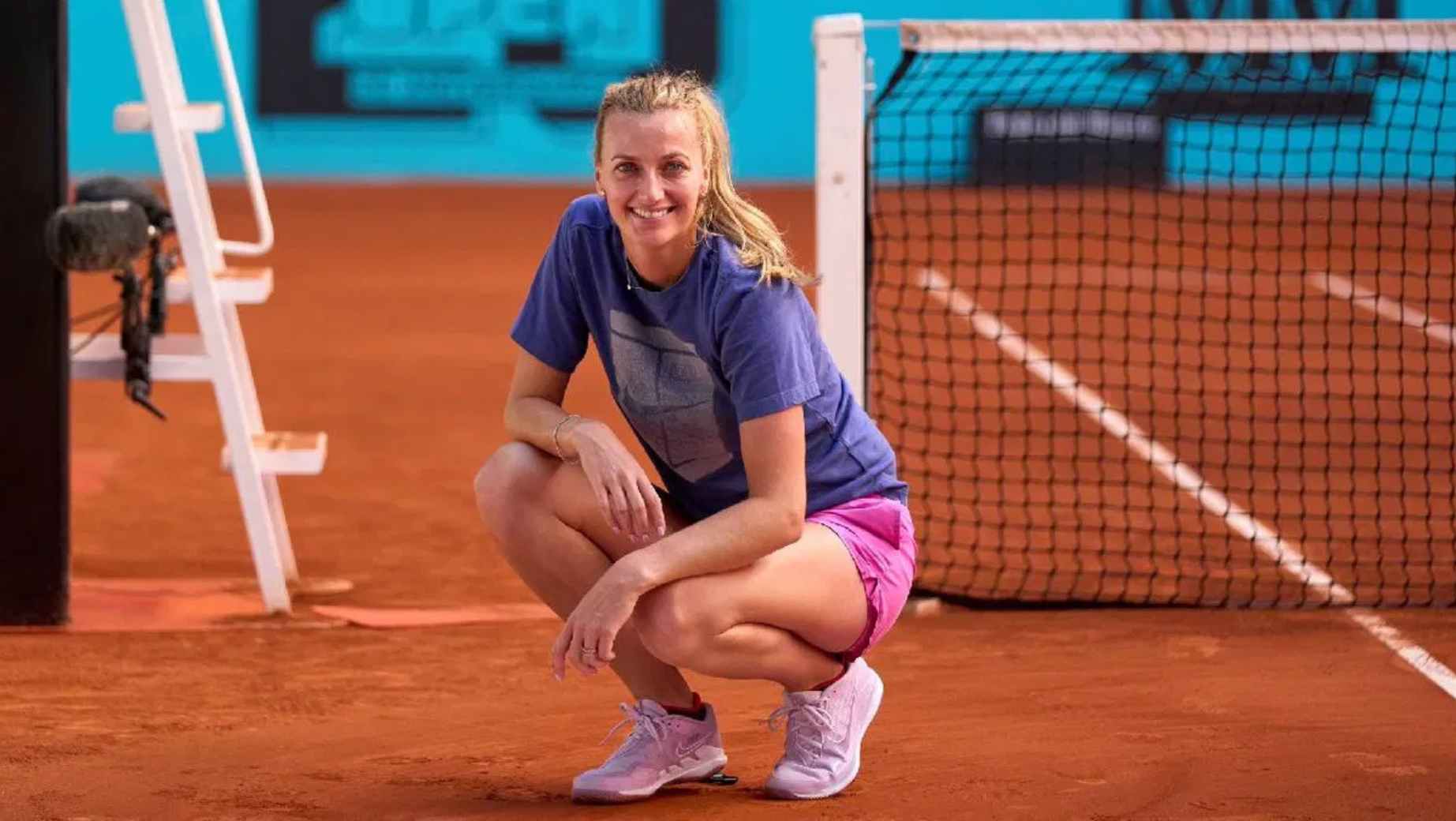
One of the top players of the last decade, Kvitova’s huge, lefty serve and powerful groundstrokes made her particularly imperious on grass. She beat Maria Sharapova in straight sets for her maiden grand slam title at SW19, before lifting the Venus Rosewater Dish for the second time in 2014, overcoming Eugenie Bouchard in straight sets.
Kvitova’s lengthy and successful career may yet have yielded more titles had she not suffered a horrific attack during a break-in at her home in the Czech Republic in the 2017 off-season, resulting in serious injuries to the tendons and nerves in her dominant left hand.
She returned to action that May, a month ahead of schedule, but slipped out of the top 20 over the course of a difficult season.
She came back to near her best in 2019, reaching the final in Melbourne before losing to Naomi Osaka, and clinched the Miami Open title in 2023, her biggest title in five years, before taking the 2024 season off to have son Petr.

The 35-year-old returned from tennis earlier this year after maternity leave and has been on the comeback trail, losing in a hard-fought first-round battle with Beatriz Haddad Maia at Queen’s last week, before withdrawing from the Nottingham Open with a hip injury.
She has earned a wildcard to Wimbledon this summer and added that while she did not yet know her calendar for the US hard-court swing, she intends to formally finish her playing career at the US Open, where she reached the quarter-finals twice.
